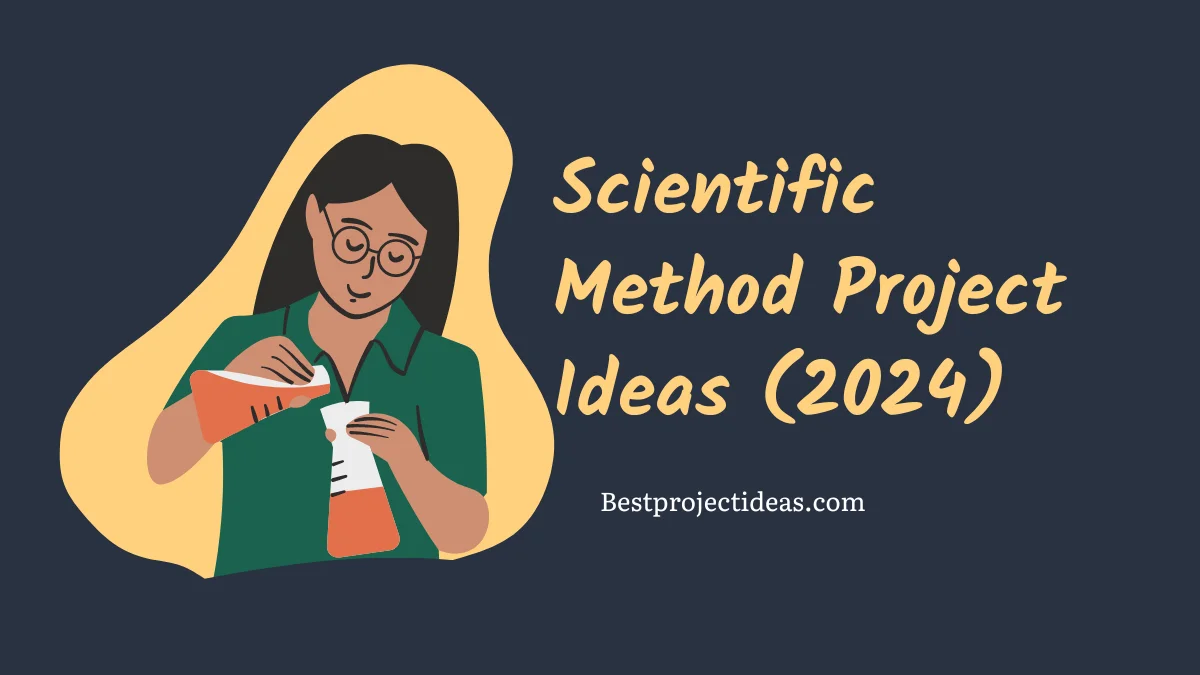
The Scientific Method helps us learn about the world. It shows us how to ask questions, make guesses, and find answers step by step.
With the Scientific Method, we can figure out how things work and solve puzzles using proof.
If you want to know more about plants, animals, or simple machines, the Scientific Method can help. Following its steps, you’ll see how fun and exciting science can be.
You can do your own experiments and find out cool things about nature using the Scientific Method.
Must Read: 221+ Latest Art Project Ideas For High School Students
What Is The Scientific Method For A Project?
The scientific method is a step-by-step way that researchers use to learn about the world, find new knowledge, or improve what we already know. Here is a simple summary of the steps:
- Observation: Notice something and ask a question or find a problem.
- Research: Look for background information about the topic.
- Hypothesis: Make a guess or prediction that you can test.
- Experiment: Plan and do tests to check the hypothesis.
- Data Collection: Collect and write down the results from the experiment.
- Analysis: Look at the data and figure out what it means.
- Conclusion: Decide if the hypothesis was right, wrong, or needs to be changed based on the results.
- Communication: Share what was learned with others, usually through a report or article.
These steps help ensure that scientific investigations are clear, repeatable, and based on evidence.
Scientific Method Project Ideas For High School
Here are the most unique scientific method project ideas for high school students:
Physical Sciences:
- How soap bubbles change in sunlight
- Testing different materials for heat conduction
- Comparing boiling points of various liquids
- Exploring sound waves through different objects
- Studying friction on different surfaces
- Examining how magnets affect plant growth
- Investigating the strength of homemade glues
- Measuring light reflection from various materials
- Testing water’s ability to dissolve substances
- Exploring how temperature affects battery life
- Comparing insulation properties of different fabrics
- Studying the effects of air pressure
- Investigating how shape affects falling objects
- Examining the properties of non-Newtonian fluids
- Testing the strength of different bridge designs
Chemistry:
- Making natural dyes from plants
- Studying how temperature affects crystal growth
- Comparing the acidity of common household liquids
- Investigating rust formation on various metals
- Examining how salt affects water’s boiling point
- Testing the effectiveness of homemade soaps
- Studying the effects of acid rain
- Comparing different methods of water purification
- Investigating how temperature affects gas solubility
- Examining the properties of biodegradable plastics
- Testing the shelf life of homemade foods
- Studying the effects of different fertilizers
- Investigating how pH affects plant growth
- Examining the properties of different polymers
- Testing the effectiveness of natural preservatives
Biology:
- Studying how music affects plant growth
- Comparing germination rates of different seeds
- Investigating the effects of caffeine on plants
- Examining how light color affects photosynthesis
- Testing the effectiveness of natural pesticides
- Studying how exercise affects heart rate
- Comparing growth rates of various mold types
- Investigating how temperature affects enzyme activity
- Examining the effects of pollution on plants
- Testing the effectiveness of natural antibiotics
- Studying how diet affects memory in mice
- Comparing decomposition rates of organic materials
- Investigating how stress affects plant growth
- Examining the effects of sleep on learning
- Testing the effectiveness of probiotics
Environmental Science:
- Studying the effects of oil spills
- Comparing the biodegradability of different materials
- Investigating air quality in different areas
- Examining the effects of composting methods
- Testing the effectiveness of water filters
- Studying how fertilizer runoff affects algae
- Comparing the energy efficiency of light bulbs
- Investigating the effects of littering
- Examining soil quality in different locations
- Testing the effectiveness of recycling methods
- Studying how deforestation affects local climate
- Comparing the effectiveness of different solar panels
- Investigating the effects of noise pollution
- Examining how pollution affects plant growth
- Testing the effectiveness of green roofs
Earth Science:
- Studying how erosion affects different soils
- Comparing weathering rates of various rocks
- Investigating the effects of acid rain
- Examining how volcanoes form different rocks
- Testing the porosity of different soil types
- Studying how earthquakes affect building materials
- Comparing the properties of different gems
- Investigating how glaciers shape landscapes
- Examining the effects of ocean acidification
- Testing the strength of different minerals
- Studying how plate tectonics affect landforms
- Comparing different methods of water conservation
- Investigating the effects of deforestation
- Examining how sinkholes form in limestone
- Testing the effectiveness of erosion controls
Astronomy:
- Studying how moon phases affect tides
- Comparing the brightness of different stars
- Investigating the effects of light pollution
- Examining how seasons affect day length
- Testing the accuracy of different star charts
- Studying how solar flares affect radio
- Comparing different methods of planet detection
- Investigating the effects of meteor impacts
- Examining how telescopes magnify distant objects
- Testing the effectiveness of homemade solar viewers
- Studying how gravity affects plant growth
- Comparing orbital periods of different planets
- Investigating the effects of space weather
- Examining how the atmosphere affects starlight
- Testing accuracy of sundials in timekeeping
Physics:
- Studying how pendulum length affects swing
- Comparing the efficiency of different simple machines
- Investigating the effects of air resistance
- Examining how springs store potential energy
- Testing the strength of different electromagnets
- Studying how prisms separate light colors
- Comparing the accuracy of different projectile launchers
- Investigating the effects of centripetal force
- Examining how lenses focus light rays
- Testing the efficiency of different pulleys
- Studying how mass affects gravitational pull
- Comparing buoyancy of different-shaped objects
- Investigating the effects of angular momentum
- Examining how mirrors reflect light beams
- Testing the conductivity of different liquids
Genetics:
- Studying inheritance patterns in fruit flies
- Comparing genetic traits in plant varieties
- Investigating the effects of mutations on bacteria
- Examining how DNA extraction methods work
- Testing accuracy of genetic prediction models
- Studying how genes affect physical traits
- Comparing DNA fingerprinting techniques
- Investigating the effects of radiation on seeds
- Examining how selective breeding changes plants
- Testing the effectiveness of gene therapy methods
- Studying how genetics influence animal behavior
- Comparing genetic diversity in ecosystems
- Investigating the effects of inbreeding on plants
- Examining how gene expression affects development
- Testing accuracy of paternity testing methods
Microbiology:
- Studying how antibiotics affect bacteria growth
- Comparing the effectiveness of different disinfectants
- Investigating the effects of temperature on microbes
- Examining how probiotics affect gut health
- Testing growth rates of different yeasts
- Studying how pH affects bacterial reproduction
- Comparing fermentation rates in foods
- Investigating the effects of UV light on microbes
- Examining how salt affects bacterial growth
- Testing the effectiveness of natural antimicrobials
- Studying how bacteria break down materials
- Comparing biofilm formation on surfaces
- Investigating the effects of oxygen on anaerobes
- Examining how bacteria communicate chemically
- Testing accuracy of water quality tests
Neuroscience:
- Studying how music affects brain waves
- Comparing reaction times to different stimuli
- Investigating the effects of sleep on memory
- Examining how exercise affects cognitive function
- Testing the effectiveness of memory techniques
- Studying how color affects mood
- Comparing left-brain vs right-brain activities
- Investigating the effects of meditation on stress
- Examining how multitasking affects performance
- Testing accuracy of lie detection methods
- Studying how scents affect memory recall
- Comparing the effectiveness of learning styles
- Investigating the effects of caffeine on alertness
- Examining how video games affect reflexes
- Testing effectiveness of brain training apps
Zoology:
- Studying how light affects animal behavior
- Comparing the feeding habits of different species
- Investigating the effects of habitat loss
- Examining how animals adapt to climate
- Testing the effectiveness of animal enrichment
- Studying how pollution affects aquatic life
- Comparing migration patterns of birds
- Investigating the effects of noise on wildlife
- Examining how predators affect prey populations
- Testing the effectiveness of wildlife corridors
- Studying how social structure affects breeding
- Comparing camouflage techniques in nature
- Investigating the effects of invasive species
- Examining how animals use echolocation
- Testing the effectiveness of wildlife deterrents
Botany:
- Studying how gravity affects plant growth
- Comparing photosynthesis rates in leaves
- Investigating the effects of soil pH on plants
- Examining how plants respond to touch
- Testing the effectiveness of natural fertilizers
- Studying how plants communicate chemically
- Comparing drought tolerance in species
- Investigating the effects of air pollution
- Examining how plants attract pollinators
- Testing the effectiveness of hydroponics systems
- Studying how plants defend against pests
- Comparing seed dispersal mechanisms
- Investigating effects of light wavelengths
- Examining how plants sense day length
- Testing the effectiveness of plant hormones
Psychology:
- Studying how color affects taste perception
- Comparing the effectiveness of memory techniques
- Investigating the effects of music on mood
- Examining how social media affects self-esteem
- Testing the accuracy of eyewitness testimonies
- Studying how scents affect consumer behavior
- Comparing decision-making in groups vs. individuals
- Investigating the effects of positive reinforcement
- Examining how body language affects communication
- Testing the effectiveness of anger management techniques
- Studying how birth order affects personality
- Comparing cultural differences in nonverbal cues
- Investigating the effects of praise on motivation
- Examining how color affects learning
- Testing the effectiveness of different study methods
Meteorology:
- Studying how buildings affect wind patterns
- Comparing the accuracy of weather prediction methods
- Investigating the effects of urban heat islands
- Examining how clouds form in the atmosphere
- Testing the effectiveness of homemade weather instruments
- Studying how pressure affects storm formation
- Comparing rainfall amounts in different areas
- Investigating the effects of El Niño phenomenon
- Examining how mountains affect local weather
- Testing accuracy of humidity measurement tools
- Studying how fog forms over water bodies
- Comparing snowflake formation in varying temperatures
- Investigating the effects of global warming on weather
- Examining how air masses affect climate
- Testing the effectiveness of hail prediction models
Scientific Method Project Ideas For Science Fairs
- Test plant growth with different music
See how music affects plant development. - Compare toothpaste brands’ cleaning power
Measure the effectiveness of various toothpaste types. - Examine fingerprint patterns in families
Study genetic links in fingerprint characteristics. - Measure phone radiation levels
Test radiation output from different phones. - Test natural vs. chemical bug repellents
Compare the effectiveness of various insect repellents. - Analyze local water quality
Test water from different sources. - Investigate mold growth on bread
Observe factors affecting mold development. - Compare biodegradable vs. regular plastics
Measure breakdown rates of different plastics. - Test homemade vs. store-bought cleaning products
Compare the effectiveness of cleaning solutions. - Examine the effects of video games on reaction time
Measure how gaming impacts response speed.
Scientific Method Project Ideas for College Students:
- Analyze social media’s impact on mental health
Study effects of platforms on well-being. - Test the effectiveness of eco-friendly packaging materials
Compare the biodegradability of different packaging options. - Examine blue light’s effect on sleep patterns
Measure how screen time impacts sleep. - Study the impact of meditation on stress levels
Test meditation’s influence on cortisol levels. - Investigate the urban heat island effect
Measure temperature differences in city areas. - Analyze microplastics in local water sources
Test for the presence of tiny plastic particles. - Examine the effects of caffeine on cognitive performance
Measure how caffeine impacts brain function. - Study the impact of different diets on gut microbiome
Analyze changes in intestinal bacteria populations. - Investigate noise pollution effects on wildlife
Observe animal behavior near noisy areas. - Test the effectiveness of various renewable energy sources
Compare the output of different green technologies.
These project ideas are crafted to encourage hands-on learning and observation while also maintaining a clear focus on the scientific method.
How Do You Plan A Scientific Project?
To plan a scientific project using the scientific method, follow these simple steps:
- Identify a question or problem: Decide what you want to learn or solve.
- Research background information: Look for existing information on your topic to help guide your study.
- Formulate a hypothesis: Make a guess that you can test, predicting what you think will happen.
- Design an experiment: Set up a study to test your guess. This includes:
- Choosing what factors to change or keep the same (variables)
- Figuring out how to measure what happens
- Deciding how many samples you need and how to choose them
- Planning how to collect the data
- Collect data: Do your experiment and carefully write down what you observe and measure.
- Analyze results: Use simple math or statistics to understand what your data shows.
- Draw conclusions: Decide if your data supports or disproves your guess.
- Report findings: Write down everything you did, what you found, and what you learned.
- Peer review: Let other scientists check your work to ensure it is correct.
- Iterate: Based on what you found and the feedback you received, make changes to your guess or methods and think about new studies to try.
Also Read: 121+ Latest Nursing Capstone Project Ideas With PDF
Summary
The Scientific Method helps us learn about the world in a fun way. It shows us how to ask questions and find answers step by step. When we use it, we can figure out how things work and solve puzzles using facts.
It doesn’t matter if you like plants, animals, or machines – the Scientific Method can help you learn more. By following the steps, you’ll see how cool science can be.
You can do your own tests and find out neat stuff about nature.
The Scientific Method turns your questions into discoveries. Each step brings you closer to understanding things better. It’s an adventure that lets you be a real scientist.
You can use it to learn about anything you’re interested in. Try it out and see how much fun it is to do science!

